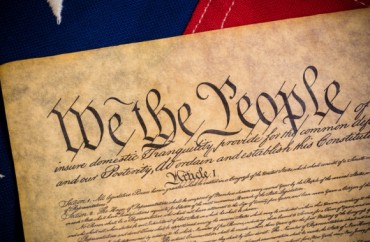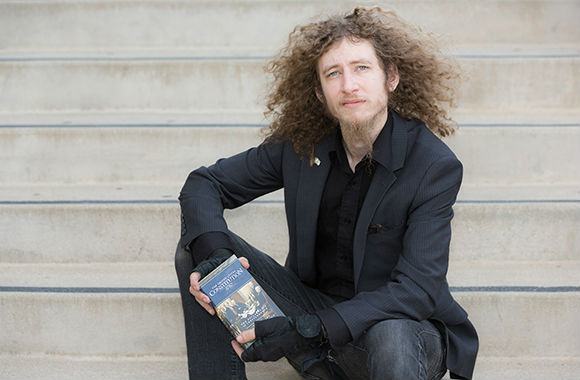
Campus is a public forum regardless of your regulations
Pierce College is already on the bad side of the Trump administration.
Attorney General Jeff Sessions denounced it in a speech last year announcing the Justice Department would support First Amendment lawsuits targeting “free speech zones” on campus. DOJ formally entered a “statement of interest” in the Pierce case a month later.
Now the Los Angeles-area community college is on the bad side of the federal judge hearing student Kevin Shaw’s lawsuit against the school for not letting him distribute Spanish-language copies of the U.S. Constitution.
U.S. District Judge Otis Wright knocked down the college’s arguments without even waiting for oral argument.
He said Shaw had met the “injury in fact” standard required to bring suit, even though the college hadn’t punished him after he stopped distributing Constitutions outside its tiny free-speech zone:
Thus, in order to “avoid the chilling effect of sweeping restrictions, the Supreme Court has endorsed what might be called a ‘hold your tongue and challenge now’ approach rather than requiring litigants to speak first and take their chances with the consequences.” … A plaintiff’s alleged harm qualifies as an “injury in fact” where the defendant’s actions invade a legally protected interest that is: “(a) concrete and particularized; and (b) ‘actual or imminent, not ‘conjectural’ or ‘hypothetical.’”
By requiring Shaw to obtain a permit before he can continue handing out the copies – an “unpublished requirement,” as Shaw called it – Pierce threatened the student with a “concrete injury,” according to Wright.
The student has also sufficiently alleged the “threat of future enforcement” against him if he distributes Constitutions without a permit, and has stated that he’ll “continue engaging in protected activity” and remain at risk of punishment.
MORE: DOJ joins legal fight against campus speech zones
Wright also rebuked Pierce for claiming that its grounds are not generally available for students to speak freely:
On Pierce’s campus, there are “open areas and sidewalks beyond the Free Speech Area where student speech, expressive activity, and distribution of literature would not interfere with or disturb access to college building or sidewalks….” [quoting the lawsuit]. … At the time administrators stopped Shaw from distributing Spanish-language copies of the U.S. Constitution, he was alongside a “large thoroughfare called ‘the Mall’” and was not “disrupting campus operations or interfering with foot traffic.” … These facts tend to establish the open areas of Pierce’s campus are a public forum. …
Given the traditional purpose of the open, outdoor areas of universities, such as the “Mall” on Pierce’s campus, the Court finds that these areas are traditional public fora, regardless of Pierce’s regulations naming them non-public fora.
The college even appears to be out of step with the community college district, which gave each college president “authority to delegate” parts of campus “outside of the Free Speech Area as public fora,” Wright wrote.
And if Shaw (below) is correct that the college’s policy “does not provide ‘narrow objective [sic], and definite standards to guide the licensing authority’ [for reserving the free-speech zone], it is invalid on its face,” the judge continued.
MORE: Pierce College stops Spanish speakers from reading the Constitution
Wright also refused to dismiss individual officials as defendants – the college president, the vice president and dean of student services, and the dean of student engagement – because Shaw “alleges facts establishing each individual defendant’s alleged role in violating his rights.”
The college only got one major reprieve: The individual defendants can’t be personally liable for monetary damages. Wright said he can’t determine whether Shaw’s rights were “clearly established” as protected speech under relevant case law because it’s muddled:
Given the range of cases addressing the status of universities as public or nonpublic fora, and the differing classifications attributed to different aspects of a university’s campus, the Court cannot make that finding here.
The Foundation for Individual Rights in Education, which is sponsoring Shaw’s lawsuit, focused on Wright’s finding that the campus is a public forum regardless of how Pierce designates it.
The group also pointed to the judge’s finding that limiting speech to 616 square feet of campus space “does not achieve Defendants’ stated goals without unnecessarily impeding students’ First Amendment rights”:
“The court’s ruling sends an important message to colleges nationwide that still restrict student speech to free speech zones,” said FIRE Director of Litigation Marieke Tuthill Beck-Coon. “The campus is a college student’s public square. It’s their space to be engaged citizens. The public recognizes this. So do courts across the country. Now it’s time for [the Los Angeles Community College District] to follow suit.”
Read the order and FIRE’s post.
MORE: New report says there’s no free speech ‘crisis’ on campus
IMAGE: Shutterstock, Foundation for Individual Rights in Education
Like The College Fix on Facebook / Follow us on Twitter







Please join the conversation about our stories on Facebook, Twitter, Instagram, Reddit, MeWe, Rumble, Gab, Minds and Gettr.